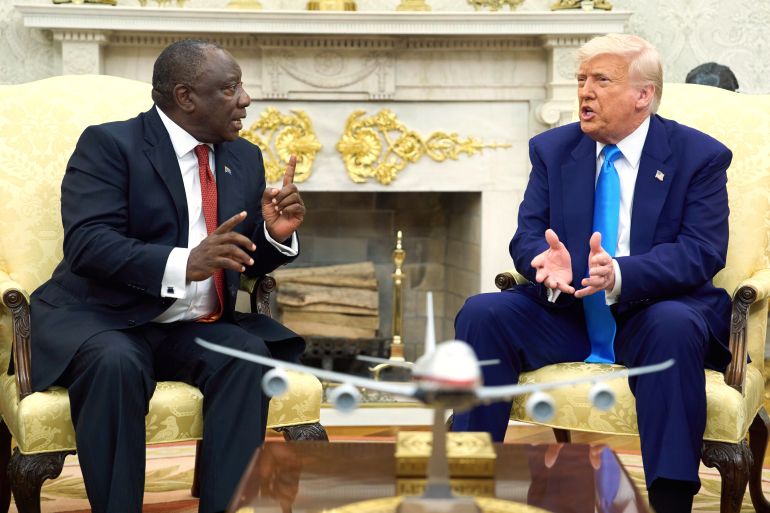Trump’s US boycott of G20 summit is ‘their loss’, South Africa says
President Ramaphosa says, ‘The United States needs to think again whether boycott politics actually works because in my experience it doesn’t work.’

By Al Jazeera Staff and News Agencies
Published On 13 Nov 202513 Nov 2025
Save
South African President Cyril Ramaphosa says United States President Donald Trump’s decision to boycott the Group of 20 (G20) summit next weekend in Johannesburg is “their loss”.
The US has ratcheted up tensions with South Africa over widely rejected claims of persecution of white minority Afrikaners, which it vehemently denies, and its push for Israeli accountability over the genocide in Gaza at the International Court of Justice (ICJ).
Recommended Stories
list of 3 itemsend of list
Speaking on Wednesday, Ramaphosa added: “The United States needs to think again whether boycott politics actually works because in my experience it doesn’t work.”
Trump on Friday said no US officials will attend this year’s G20 summit on November 22-23 of leaders from 19 of the world’s richest and leading developing economies, the European Union and African Union. Trump cited South Africa’s treatment of white farmers, which he has falsely labelled a “genocide”, writing on his Truth Social platform that it was a “total disgrace that the G20 will be held in South Africa”.
Since returning to the White House in January, Trump has repeatedly claimed that white South Africans are being violently persecuted and having their land taken from them because of their race in the Black-majority country, a claim rejected by South Africa’s government and top Afrikaner officials.
Trump for months has targeted the nation’s Black-led government for criticism over that and a range of other issues, including its decision to accuse staunch US ally Israel of genocide against Palestinians in Gaza in an ongoing case at the ICJ in The Hague.
Advertisement
Last month, Ramaphosa said the current Gaza ceasefire, which Israel is violating on a daily basis, will not affect his country’s genocide case against Israel, stressing that South Africa is determined to pursue its case, filed in 2023, despite the truce, which is part of a US-backed plan aimed at ending Israel’s war on the besieged and bombarded territory.
South Africa submitted 500 pages of evidence to the ICJ in October 2024. Israel’s counterarguments are due by January 12. Oral hearings are anticipated in 2027 with a final judgement expected in late 2027 or early 2028.
The ICJ has issued three provisional measures, ordering Israel to prevent genocidal acts and allow humanitarian aid into Gaza. Israel has largely failed to comply.
“It is unfortunate that the United States decided not to attend the G20,” Ramaphosa told reporters outside the South African Parliament on Wednesday. “The United States by not being at the G20, one must never think that we are not going to go on with the G20. The G20 will go on. All other heads of state will be here. In the end, we will take fundamental decisions and their absence is their loss.”
Ramaphosa added that the US is “giving up the very important role that they should be playing as the biggest economy in the world”.
Trump previously confronted Ramaphosa with his baseless claims that the Afrikaner white minority in South Africa were being killed in widespread attacks when the leaders met at the White House in May. At that meeting, Ramaphosa lobbied for Trump to attend the G20 summit, the first to be held in Africa.
The G20 was formed in 1999 to bring rich and developing countries together to address issues affecting the global economy and international development. The US, China, Russia, India, Japan, France, Germany, the United Kingdom and the European Union are all members. The US is due to take over the rotating presidency of the G20 from South Africa at the end of the year.
Trump’s claims about anti-white violence and persecution in South Africa have reflected those made previously by conservative media commentators in the US as far back as 2018.
Trump and others, including South African-born Elon Musk, the world’s richest man, have also accused South Africa’s government of being racist against whites because of its affirmative action laws that aim to advance opportunities for the Black majority, which was oppressed under the former apartheid system of racial segregation.
Ramaphosa’s government has said the comments are the result of misinformation and a lack of understanding about South Africa.
Advertisement
Relations between the US and its biggest trading partner in Africa are at their lowest since the end of apartheid in 1994. Washington expelled the South African ambassador to the US in March over comments he made regarding Trump.

